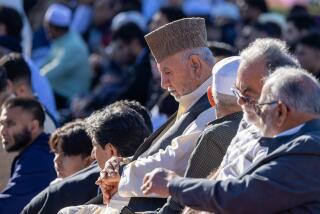Happy Nou-Rooz : Iranians Celebrate New Year and Keep Their Customs Alive
- Share via
IRVINE — The sign on Culver Drive near Mason Park said: “Persian New Year Celebration,” with an arrow pointing to the next right.
Arjang Arjangian, an Iranian native who runs his own desktop publishing company in San Pedro, laughed at the thought as he walked Sunday among the throngs gathered at the park.
“They should have added: ‘and Arabian Nights.’ All this culture and this ancient custom in the middle of Irvine,” he said. “To me, it’s so surreal.”
Arjangian did not mean to mock. He was one of the organizers of an event that by police estimates drew 30,000 people, mostly Iranian natives or their children gathered to mark Nou-Rooz, the Persian New Year.
All over Southern California, home to about 500,000 Iranians, the 13th day of Nou-Rooz was being celebrated in outdoor events such as this one. Technically, Sunday was the 12th day, but like many other customs brought to this country by immigrants, this one was altered slightly to fit the workweek.
Because on Sizdeh-Bedar, the 13th day, it is considered bad luck to stay indoors, Iranians bundle up their children and their older relatives, pack some food and take to the outdoors.
“It’s a way for us to keep our culture and our traditions alive, and to encourage the young people to remember all this,” Behzad Khazale, 30, an event organizer from Santa Monica, said about the Irvine celebration.
On one hand, the celebration seemed little more than one big picnic. There were no commercial booths selling food or souvenirs or cassette tapes of traditional music, as in other ethnic celebrations. Farsi, the Iranian language, could be heard everywhere, and the smell of barbecued meat wafted through the air.
But at midday, hundreds gathered around a ring decorated in red, white and green, the colors of the Iranian flag, to watch an athletic event called varzesh baustani.
Known as the dance of the heroes, the ancient sport evolved from a postwar celebration to a performance of skill that is part aerobic exercise, part juggling and is set to traditional music and song.
As the wind swayed the eucalyptus trees in the background, 16 men and boys--ranging in age from 5 to 65--danced in a circle, dressed in colorful embroidered knickers, white sweat shirts and sneakers. They juggled wooden pins that weighed up to 40 pounds as another man chanted the words of an ancient epic and banged on a drum.
Most of the day, people gathered in small knots of families and friends, and they munched on shish kebabs marinated in a yogurt-based dressing, or falafel bread or ash reshteh, the traditional New Year soup made of noodles, mint, garlic and vinegar.
The annual picnic, said 22-year-old Banafsheh Akhlaghi of Mission Viejo, is even more important for those who came to this country at a very young age, as she did, and been raised in an American environment.
“I’ve been here 17 years, and to see the traditions continuing in this country is very, very important,” she said.
As Shahrzad Sepanloa, 18, a drama major at Mt. San Antonio College in Hacienda Heights said: “We have to respect ourselves and our own traditions in order for others to respect us.”
More to Read
Sign up for Essential California
The most important California stories and recommendations in your inbox every morning.
You may occasionally receive promotional content from the Los Angeles Times.
![LOS ANGELES, CA - JUNE 17: [Cody Ma and Misha Sesar share a few dishes from their Persian Restaurant Azizam] on Monday, June 17, 2024 in Los Angeles, CA. (Ethan Benavidez / For The Times)](https://ca-times.brightspotcdn.com/dims4/default/7ffc7f6/2147483647/strip/true/crop/5110x3417+306+0/resize/320x214!/quality/75/?url=https%3A%2F%2Fcalifornia-times-brightspot.s3.amazonaws.com%2F79%2Fdc%2F4d29255545f5b9813315901692bc%2F1459972-fo-azizam-review20-eba.JPG)












